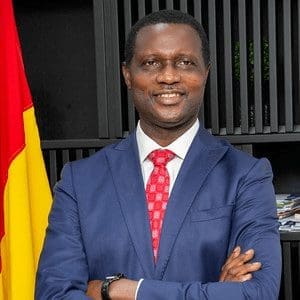Former Education Minister Dr. Yaw Osei Adutwum has made a pointed pledge to conduct what he calls a “clean campaign” in the New Patriotic Party (NPP) flagbearer race, declaring that “true leaders don’t rely on insults to win elections.”
The Bosomtwe Member of Parliament’s commitment came during Friday’s address to former party executives in the Mampong zone as part of his ongoing “Hope Tour” across the Ashanti Region, where he’s building support ahead of the January 31, 2026 presidential primary.
“I will not allow anyone on my team to insult or malign others. My focus is to share my vision with the delegates and appeal to their conscience,” Adutwum told the gathering, emphasizing his determination to maintain campaign discipline among his supporters.
His declaration arrives amid growing concerns about the tone of the NPP’s internal competition. The party’s Council of Elders recently issued warnings against insulting language, sectional campaigning, and defamatory attacks that could harm the party’s prospects in the 2028 general elections.
Adutwum’s emphasis on campaign civility appears calculated to distinguish his approach from rivals in what’s becoming an increasingly competitive race. Five prominent candidates are seeking the nomination: former Vice President Dr. Mahamudu Bawumia, former Assin Central MP Kennedy Agyapong, former General Secretary Kwabena Agyei Agyepong, Adutwum himself, and Abetifi MP Dr. Bryan Acheampong.
The former minister dismissed what he termed “empty gestures of reconciliation” that typically follow internal party damage, arguing for proactive unity rather than reactive damage control. “After the contest, we must work together in unity — not by setting up reconciliation committees after the damage is done, but by running a clean and respectful campaign from the start,” he explained.
His comments reflect lessons learned from previous NPP internal contests that have sometimes left lasting wounds. Former President John Agyekum Kufuor recently warned party members not to allow internal leadership competition to destroy unity ahead of 2028, highlighting ongoing concerns about divisive campaigning.
Adutwum specifically addressed attempts to undermine his candidacy through character assassination, stating firmly that efforts to “defame my character will not succeed.” This suggests his campaign has already encountered negative attacks that prompted his public response about maintaining campaign standards.
The NPP has established a five-member committee to police the flagbearer campaign against personal attacks, demonstrating institutional recognition of the risks posed by uncivil political discourse within party ranks.
Interestingly, Dr. Bawumia has made similar appeals for respectful, idea-driven campaigning, suggesting multiple candidates recognize the political value of positioning themselves as unity-minded leaders above negative tactics.
Adutwum’s “Hope Tour” represents his systematic effort to build grassroots support across the NPP’s traditional stronghold in Ashanti Region. Recent endorsements from NPP delegates in Effiduase and support declarations from Railway Market traders in Kumasi indicate his campaign is gaining traction among key constituencies.
The former Education Minister faces the challenge of expanding his political identity beyond his ministerial record. His campaign launch emphasized a comprehensive “war against poverty” as he seeks to broaden appeal beyond education reform credentials that defined his cabinet tenure.
Adutwum is among five aspirants seeking to convince the party base that their leadership would secure both electoral victories and tangible benefits for members. His clean campaign promise appears designed to appeal to delegates concerned about party unity and electability.
The January 2026 primary timeline creates urgency for candidates to differentiate themselves while avoiding damage to party cohesion. The NPP began vetting aspirants on September 23, 2025, at party headquarters under a committee chaired by Dr. Addo Kufuor, formalizing the contest structure.
Adutwum’s commitment to issue-based campaigning aligns with broader calls for substantive political discourse. Party observers have noted that religious bigotry, ethnicity, and financial inducements “do not resonate with electorates” and tend to “foment division, hatred and instability”.
His campaign strategy appears to recognize that NPP delegates want candidates who can unify the party while presenting compelling visions for national leadership. The emphasis on conscience-based appeals rather than negative attacks suggests confidence in his policy platform and personal record.
The former minister’s background as MP for Bosomtwe and former Education Minister provides him with both legislative experience and executive credentials. However, he faces competition from candidates with higher national profiles and stronger name recognition.
Adutwum’s clean campaign pledge creates accountability pressure on his team while potentially constraining opponents who might prefer more aggressive tactics. If other candidates engage in negative campaigning while he maintains civility, the contrast could benefit his candidacy.
The broader context of NPP’s 2024 electoral defeat adds significance to internal campaign conduct. Party members appear increasingly aware that divisive primaries could weaken their chances of reclaiming power in 2028, creating incentives for responsible campaigning.
As the race intensifies, Adutwum’s commitment to avoiding insults and personal attacks represents both a strategic positioning and a test of campaign discipline. Success will depend on whether this approach resonates with delegates seeking leadership that can restore NPP electoral fortunes.
The former Education Minister’s emphasis on vision-sharing and conscience appeals reflects confidence that substantive policy discussions will favor his candidacy over personality-driven or attack-oriented alternatives.
Source: newsghana.com.gh











